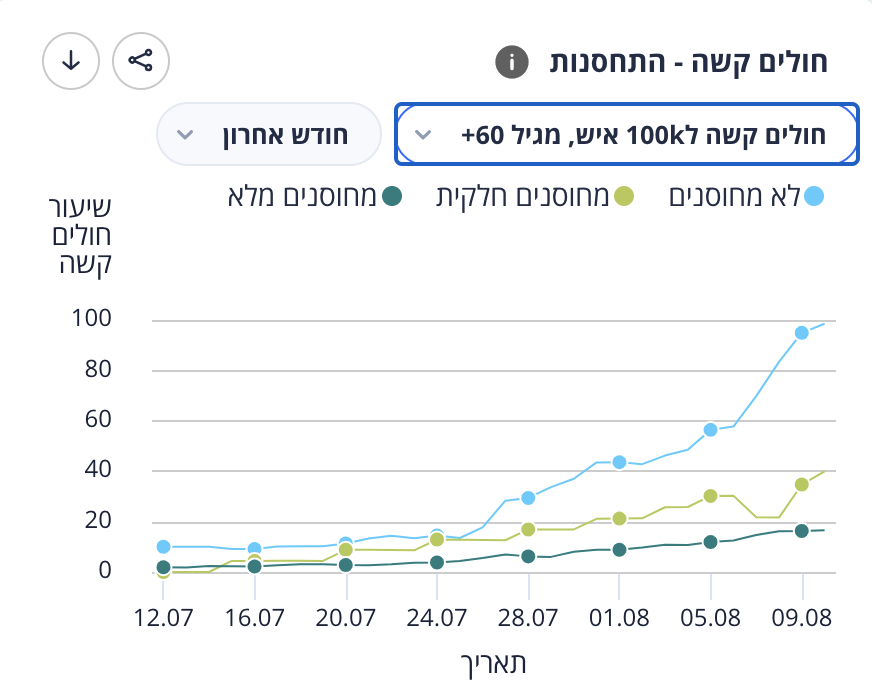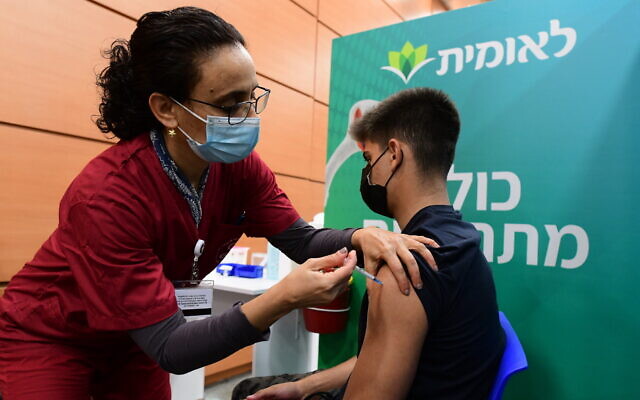Despite the Delta variant, vaccines are delivering high protection, and the rate of serious infections in Israel is six times higher among older people who fail to inoculate than others in the same age bracket.
Health Ministry data shows that among Israelis aged 60-plus, there are 16.6 people per 100,000 in serious condition. Among the unvaccinated the figure is 98.5. (There were 394 people in serious condition nationwide as of Tuesday morning, the ministry said.)
Israel is struggling with a major COVID-19 spike, and on Tuesday coronavirus czar Salman Zarka said the country was at a “critical point.”
Like other countries facing the Delta variant, Israel has seen a drop in vaccine effectiveness, with the Health Ministry announcing in early July that it is now 64 percent effective in preventing infection, while effectiveness rates were previously in the 90s.
But the key parameter is serious illness, and experts say the latest statistics paint an encouraging picture.
“They very clearly show that despite the highly infectious nature of the Delta variant, the vaccine is still kicking in and preventing serious illness,” Prof. Nadav Katz, a coronavirus statistician from the Hebrew University, told The Times of Israel.
“It’s important to show this graph. It shows how extremely effective the vaccine is in preventing morbidity,” Katz said.
In the graph, below, the blue line shows how many unvaccinated people are in serious condition per 100,000 population, and the dark green line shows fully vaccinated people. The light green refers to partly vaccinated people,

This graph, by Israel’s Ministry of Health, shows the number of serious COVID cases among over-60s by date, per 100,000 people. The left axis shows the number of people. The top line shows unvaccinated people, the bottom line shows fully vaccinated people. The bottom line represents partly-vaccinated people.
Under 60s are feeling the benefit of vaccines in avoiding serious illness, as are those above that age. For every 100,000 people under 60 who are not vaccinated, 1.6 are in serious condition with the coronavirus. Among the fully vaccinated the figure is 0.5.
The stats come as Israel’s government is trying hard to convince the 1.1 million citizens who are eligible for vaccines but failing to take shots that they should do so.
Prime Minister Naftali Bennett has spoken out harshly against vaccine refusers, and ministers are reportedly considering financial incentives to get them to inoculate. They are believed to take the view that convincing the many teenagers who are failing to vaccinate but pose a significant risk as spreaders of infection would be an effective way to prevent another lockdown.

An high school student receives a COVID-19 vaccine injection, at a vaccination center in Tel Aviv, on January 23, 2021. (Avshalom Sassoni/Flash90)
Vaccine holdouts tend to be young, with a particularly high concentration among the under-30s.
Data on vaccination levels in different locales additionally highlights lower take-up in Arab and ultra-Orthodox areas.
Nationally, some 90.2% of Israelis age 90-plus are vaccinated with at least two shots, and for the 80-89 age group the figure is 91.5%. It is even higher, 93.1%, for people in their 70s. But the rates decline among younger age groups: 87.2% for people in their 60s; 84.6 for people in their 50s and 81.2% for people in their 40s.
For Israelis in their 30s and 20s, the rates are 77.8% and 72.4% respectively. The 16-19 age group is only 68% vaccinated, and only 26.2% of 12- to 15-year-olds are fully vaccinated.

Prof. Nadav Katz, expert in coronavirus statistics, (Noam Moreno)
“The low rate of youth vaccinating suggests that parents who may well have vaccinated themselves are more hesitant about taking their teenagers for vaccines,” said Katz. He also observed that the younger people are, the smaller they see the risk that COVID-19 poses to their health, and therefore the lower the enthusiasm for vaccines.
In each age group, there is a gap of a few percent between people who are fully vaccinated and those who had a first shot but didn’t get a second.
Katz said that data on rates of serious illness should encourage these people to follow through, as it suggests that people are compromising their protection by failing to show up for a second dose.
Among the 60-plus, the partly vaccinated have 39.9 serious cases per 100,000, higher than the 16.6 for the vaccinated but far short of the 98.5 for unvaccinated.
The number of seriously ill for people under 60 are too small to allow an accurate analysis, though generally, the unvaccinated and partly vaccinated have been more likely to be in serious condition than the fully vaccinated.
“The indication here is that it’s highly recommended to follow through, and go for a second shot as it increases protection,” said Katz.

“Esploratore. Appassionato di bacon. Social mediaholic. Introverso. Gamer. Studente esasperatamente umile.”
